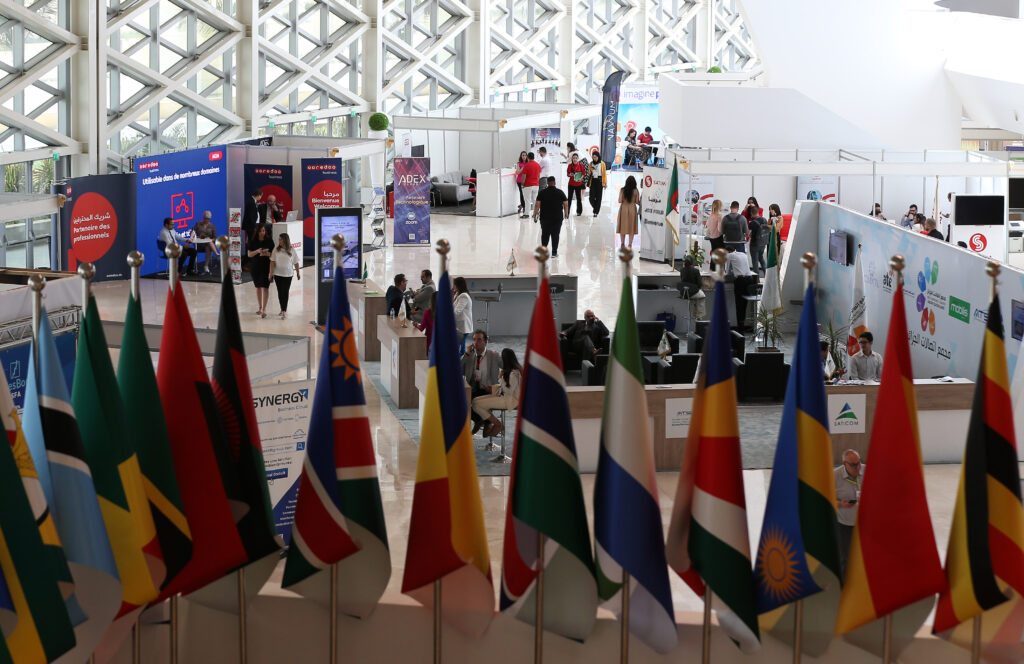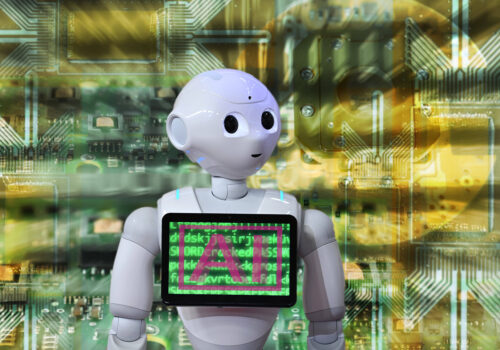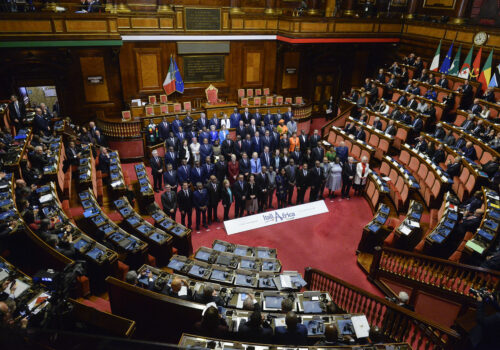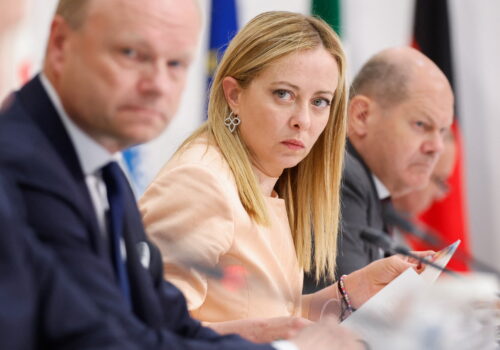As artificial intelligence (AI) continues to advance at a rapid speed, the importance of building an inclusive digital and AI ecosystem that benefits everyone cannot be overstated. Nations must now work together to harness the power of AI for sustainable development, shaping a future where innovation serves the greater good, strengthens the social fabric, and fosters equality and democracy. This vision of inclusive AI development will be a central theme at the upcoming Group of Seven (G7) ministerial meeting scheduled in Rome on October 10, where Italian and African ministers and stakeholders will convene to discuss the future of technology and development.
Central to Italian Prime Minister Giorgia Meloni’s foreign policy is the Mattei Plan, which places African nations as equal partners at the forefront of Italy’s international agenda. This strategy aims to drive sustainable development across sectors, recognizing the role that AI and other emerging technologies can play in driving innovation and industrial growth.
Italy’s commitment to leveraging AI for sustainable development aligns with the longstanding mission of the United Nations Development Programme (UNDP), which operates in more than 170 countries and territories worldwide. Both Italy and the UNDP recognize that it is imperative to create space for developing countries to not just use AI, but to become active participants and equal partners in its development, governance, and use. This approach can ensure that its benefits are harnessed responsibly, equitably, and sustainably for long-term development impact.
In this landmark year for digital development, Italy’s G7 presidency has paved the way for a significant global partnership. The Ministry of Enterprises and Made in Italy (MiMIT), the UNDP, and private sector entities in Africa have united around a common goal of promoting an inclusive, sustainable, and country-focused approach to AI. The G7, representing major economies across North America, Europe, and Asia, provides a uniquely agile forum for nurturing these vital partnerships, not only supporting technological advancements, but also reinforcing a commitment to the universality of human rights in the digital age.
The AI Hub for Sustainable Development, a collaboration that we have helped to co-develop, is a concrete outcome of these efforts. It intends on shaping new dialogues and tangible actions with African partners. The immense potential of Africa, coupled with the urgent need to accelerate progress toward the United Nations’ Sustainable Development Goals, underscores the importance of a multifaceted, collaborative, and inclusive approach.
Ask Google, Microsoft, Amazon Web Services, Leonardo, Sony, iGenius, Translated, Kytabu, InstaDeep, or any number of other companies. Ask Masakhane, the open-source initiative “by Africans for Africans” focused on natural language processing research, or the networks of excellence, the African Institute for Mathematical Sciences (AIMS) and the Next Einstein Forum, pioneering and nurturing innovation and African talent in STEM fields. The answers you will get from them will all point to the realization that Africa is not simply gearing up for an AI revolution—it’s already underway.
With 60 percent of its population under the age of twenty-five, Africa presents a unique opportunity for AI innovation. The potential is staggering: by 2030, AI could add $2.9 trillion in value to the African economy—the equivalent of increasing annual growth in gross domestic product by 3 percent. In 2021 alone, 640 African tech startups raised $5.2 billion, reflecting year-on-year growth of 92 percent.
Against this vibrant backdrop and recognizing both the immense potential and the significant challenges, MiMIT and UNDP have conceived an innovative and inclusive platform—the AI Hub for Sustainable Development. This platform recognizes the pivotal role of the private sector and is aimed at strengthening local AI ecosystems in partnership with African nations. This initiative seeks to “empower innovators, bridge the digital divide, and unlock the transformative power of AI” to create market opportunities. The AI Hub’s development has been informed by extensive consultations with G7 partners, African countries, and key stakeholders both within and beyond Africa. It aligns with the African Union’s vision of digital transformation and has received the endorsement of the G7 Digital, Tech, and Industry ministers at their meeting in Verona in March and at the G7 Leaders’ Summit in Borgo Egnazia in June.
The AI Hub aims to promote a paradigm shift by driving investments in the foundations of AI to deliver accelerated impact in areas such as agriculture, health, energy, education, water, and infrastructure. Set to become operational in 2025, the AI Hub will initially focus on the nine African countries identified by the Mattei Plan: Algeria, Egypt, Ethiopia, Kenya, Ivory Coast, Morocco, Mozambique, the Republic of Congo, and Tunisia. Institutional actors and the private sector will collaborate on data pipelines, green computational power, talent development, and creating an enabling ecosystem, all of which are essential for AI systems and their potential for sustainable development.
To prepare for the AI Hub’s activities, MiMIT, UNDP, and African partners, such as the African Union, have conducted collaborative initiatives involving governments, universities, and civil society organizations. The partners have contributed to the first public report on the codesign of the AI Hub for Sustainable Development, which analyzes the foundational elements underpinning AI and the potential role of the AI Hub in accelerating responsible private sector innovation to unlock their potential.
The Italian G7 presidency and UNDP have also launched the AI Hub for Sustainable Development Co-Design: Startup Acceleration Pilot and the Local Language Partnerships Accelerator Pilot programs. Both pilots are designed to inform the development and design of the AI Hub, with input and participation from the African Union, AIMS, Cassa Depositi e Prestiti Ventures, the Italian Innovation and Culture Hub, the International Telecommunications Union, and other global, regional, and local private sector partners.
These pilot programs aim to foster innovation and partnerships in data, green computing, and talent pipelines—the three critical pillars underpinning local AI ecosystems in Africa. By focusing on these foundational elements, the Startup Accelerator Pilot Programme seeks to address the need for an integrated private sector approach to mitigate risks and unlock the transformative power of AI for sustainable development. Meanwhile, the Local Language Partnerships Accelerator Pilot is designed to assess effective and ethical partnerships to accelerate the development and adoption of AI language technologies for sustainable local innovations.
As the codesign of the AI Hub progresses, we’re continuing to conduct in-country consultation across the nine focus countries to inform the AI Hub’s strategy and programming. This process, along with ongoing collaborations, such as the startup accelerator event, which will be hosted by the Italian Innovation and Culture Hub and the G7 Italian presidency in San Francisco in November, reinforce our belief that international cooperation must be action-oriented. This is also reflected in the broad-based coalition of the Africa Language Fund, which is still being designed. We envision this cooperation taking shape through joint project implementation, knowledge sharing, and co-investment models. Success in these efforts will be determined by stakeholders making concrete commitments, establishing formal partnerships, and developing a clear roadmap for the AI Hub’s launch and initial operations. We believe that this approach is crucial to create the necessary guardrails and foundations for local stewardship of AI.
As we move toward the AI Hub’s operational kickoff in 2025, we remain intent on strengthening the foundations of AI to generate industrial growth in Africa. Through these efforts, we’re supporting an AI revolution in Africa that is already underway, ensuring it delivers sustainable and equitable benefits across the continent for everyone.
Vincenzo Del Monaco is minister plenipotentiary at the Ministry of Enterprises and Made in Italy and co-chair of the G7 Digital and Tech Working Group.
Eva Spina is head of department for digital connectivity and new technologies at the Ministry of Enterprises and Made in Italy, and co-chair of the G7 Digital and Tech Working Group.
Keyzom Ngodup Massally is head of digital and AI programmes at the United Nations Development Programme.
Further reading
Fri, Jul 5, 2024
Advancing AI safety requires international collaboration. Here’s what should happen next.
New Atlanticist By Courtney Lang
In May, ten countries and the European Union met in South Korea to establish an international network of AI safety institutes. Next, this network should focus on three specific objectives.
Mon, Feb 5, 2024
Italy’s Mediterranean pivot: What’s driving Meloni’s ambitious plan with Africa
New Atlanticist By Alissa Pavia
The Mattei Plan for Africa was presented on January 29-30 to a delegation of more than twenty-five African leaders. It seeks to establish an Italian agenda that prioritizes Africa's needs and avoids predatory practices.
Wed, Jan 31, 2024
Italy’s G7 presidency can be a breakthrough for the ‘West’ and the ‘Rest’
New Atlanticist By Paolo Messa, Karim Mezran
Rome is already working on revamping traditional power structures and fostering a new ethos—one that envisions new opportunities for partnership.
Image: The African digital summit in Algiers, Algeria, on May 31, 2022, at the International Conference Center, with the participation of more than 1,200 decision makers and a hundred exhibiting companies and startups. Photo by APP/NurPhoto.



